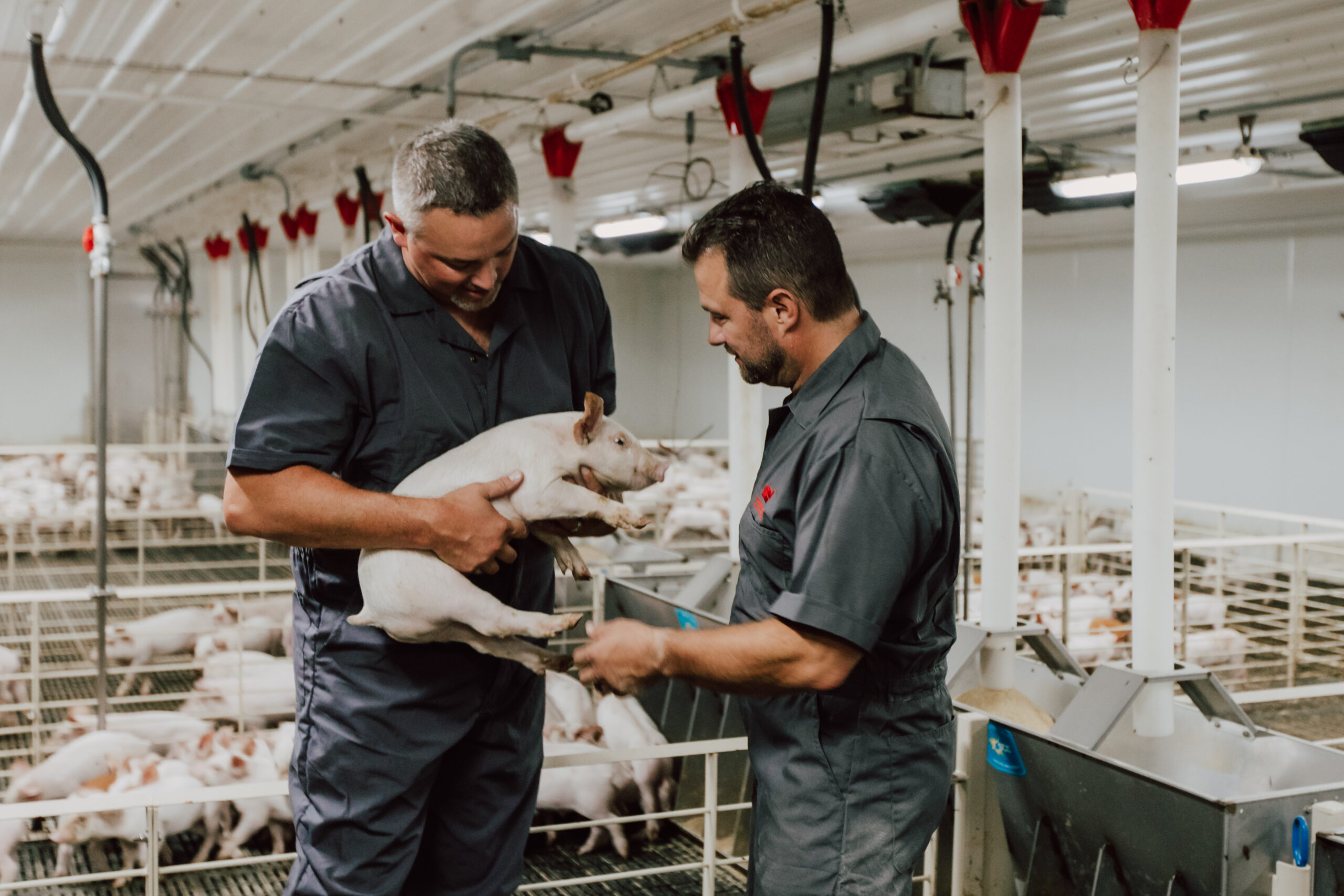Written by: Ashley Wagner, Ph.D., Director of US Business & Technical Sales Probiotech International Inc.
- Weaning is a highly stressful event for pigs.
- Intestinal health is crucial for pig well-being and performance.
- CCC, a blend of monoterpenes and polyphenols, can mitigate weaning stress.
- Improved intestinal health through CCC leads to better pig performance.
Trial Report: Impact of CCC on impaired intestinal integrity due to weaning
Pigs experience environmental, physiological, and social challenges even under the best management practices in today’s pig production systems. These challenges elicit a stress response in the brain that signals biological systems away from homeostasis. The severity of the challenge will result in differing impacts to the animal. For example, a social challenge may be mixed in open pen gestation and could lead to aggressive behaviors that may have no economic bearing or could be severe enough to lead to mortality. Although there are several challenges in today’s pig production systems, weaning is by far the greatest challenge and most stressful period for the animal. This is because weaning encompasses many stressors into a single event.

Beyond the role of digestion and absorption, the intestines operate as a defense mechanism against pathogenic bacteria and toxins. The intestinal barrier functions through physical, chemical, and immune protective mechanisms. The physical barrier comprises epithelial cells and the tight junction protein complexes (Figure 2) that selectively allow the absorption of nutrients while preventing access to pathogens and toxins. The chemical barrier prevents the colonization of pathogens via antimicrobial proteins and mucins secreted by the epithelial and goblet cells, respectively. The intestinal immune barrier protects the animal by recognizing foreign stimuli at a local level. Weaning impairs intestinal integrity, compromising the intestines’ ability to perform these barrier functions.

Alterations to the physical barrier following weaning have been well-examined in pigs. Researchers have different tools to determine the integrity of the physical barrier of the intestines. The use of the Ussing chamber system has allowed researchers to evaluate intestinal permeability by measuring transepithelial electrical resistance (TER; Smith et al., 2010). This system takes living intestinal tissue harvested from pigs, allowing researchers to examine transport barrier function and leaky gut in real time. Leaky gut occurs when there is an impairment to the intestinal physical barrier (Figure 3). Another tool researchers have is measuring the protein or mRNA expression level of the tight junction protein complexes from intestinal tissue samples. A lower expression or level of protein indicates a leaky gut. Weaning stress alters intestinal TER (Boudry et al., 2004; Smith et al., 2010; Hu et al., 2013) and decreases the expression of the following tight junction proteins: ZO-1, occludin, claudin-1, and -3 (Boudry et al., 2004; Hu et al., 2013; Cao et al., 2018).

Weaning as an event causes the pig to experience environmental, physiological, and social challenges. This alters the production of neurotransmitters utilized to signal from the brain to other biological systems that there is a stress event. There is a reduction in the amount of serotonin (a neurotransmitter involved in sleep, hunger, and general good feelings), and an increase in norepinephrine and epinephrine which work together to mobilize the body for fight or flight. This alters normal biological systems from homeostasis. Additionally, there is a rise in the stress hormone cortisol, which aids in altering normal body functions. These neurotransmitters signal many other pathways that there is a challenge (weaning), which eventually leads to alterations in digestion, absorption, and the barrier function of the intestines previously described.
So, how do we overcome what the body naturally does to set these pigs up for a successful transition during weaning?
CCC
CCC (Essential Ag Solutions, Sioux Falls, SD) is a blend of monoterpenes and polyphenols expertly selected for their anti-anxiety, anti-depressant, and antioxidant properties. Monoterpenes and polyphenols are compounds found in many plants, such as herbs (oregano, eucalyptus) and fruits (citrus and grapes). Monoterpenes are volatile compounds made up of terpene isomers. These compounds’ volatility produces an aroma that alters brain signaling. This effect is amplified when animals both smell and consume monoterpenes. This blend of compounds in CCC increases serotonin production (Perveen et al., 2009) while decreasing circulating cortisol production during a stress event such as open pen gestation (Brown et al., 2017). Together, this lowers the systemic stress response on other biological systems.
We recently completed a trial to evaluate CCC’s impacts on pigs’ intestinal integrity following weaning. This trial utilized 1296 weaned pigs from the same sow farm. Pigs were fasted during a 1-hour transportation to a commercial wean to finish the research facility. Pigs were assigned to either a control or CCC treatment: 24 pens per treatment and 27 pens per pen. Nine pigs per treatment were sacrificed on day 7 for ileum sample collection to determine tight junction gene expression. Initial body weights did not differ between treatments, but d 7 body weights were heavier in the CCC group. There was also an improvement in body weight gain during the first seven days for CCC pigs over the control. The day 7 gene expression for the tight junction proteins ZO-1, Claudin-1, -2, and -4 was elevated in the CCC group compared to the control by 49%, 151%, 232%, and 192%, respectively. The combined results of improved intestinal integrity and higher body weight at the end of 7 days indicate the ability of CCC to assist the weaned pig in a successful weaning transition.
Weaning stress is a challenge that all pigs endure. As a producer, the goal is to get them thriving quickly. This will enhance profits as well as the animal’s performance. By reducing the perception of weaning stress with CCC, intestinal integrity is less impaired. This may reduce the susceptibility to additional challenges (microbial) that may further impair performance. CCC is the key to getting over the weaning slump. Ask your Essential Ag Solutions representative about CCC; it is available in both liquid and feed form.
Citations are available upon request.

